#Climate Disruption
Explore tagged Tumblr posts
Text

Trajectories for the Future
In "Dark tidings: Anarchist Politics in the Age of Collapse," Uri Gordon paints an ominous picture: "industrial civilization is coming down," so "anarchists and their allies are now required to project themselves into a future of growing instability and deterioration."[20] I am not so sure about the imminent downfall of industrial civilization or the collapse of capitalism, but I concur that we need to project ourselves into some image of the future in order to prepare for it.[21] A complication is that the future is partially decided by how we project ourselves into it and how we imagine it. There is not a predetermined future that we merely need to prepare for. It will be shaped by how we prepare for it and by what future we prepare for. To fixate ourselves on a particular vision of the future could affect us by constricting our capacities in the present to those actions that lead to that future, blinding us to other possibilities.
Gordon mentions some possible future scenarios, summed up as "grassroots communism, eco-authoritarianism, or civil war."[22] As the ecological crisis becomes more clear and people demand change, global capitalism might attempt to recuperate by making minor adjustments and putting on a "green face" without any changes in the system that is actually causing the crisis: capitalism itself. This can only buy time, and as the crisis intensifies capitalism will employ more authoritarian and repressive measures to stay in power. It can do this either in an authoritarian, neoliberal form, deploying superficial, liberal "progressive" rhetoric while preserving existing hierarchies; or it could instead turn to "eco-fascism," combining nationalist, racist and misogynist ideas of population control and "belonging" with the need to protect nature by totalitarian means. Both are tendencies that exist in the present.[23] In either case, it can only be a matter of buying time by managing the crisis until the inevitable collapse. In his piece Gordon suggests a number of praxises that are necessary in order to resist the authoritarian tendencies during this period of interregnum as well as to build alternative communities that prefigure a new way of life, independent of global capitalism.
Another, more recent, theory of possible futures is Geoff Mann and Joel Wainwright's (M&W) "Climate Leviathan."[24] They see four different trajectories: Either the capitalist order will continue under an increasingly authoritarian global sovereign - a planetary regulatory regime that decides who gets to pollute and at which cost ("Climate Leviathan") - or it will continue without such a sovereign as reactionary and nationalist movements refuse any serious collective efforts to mitigate climate change ("Climate Behemoth"). The global sovereign might also emerge as a non-capitalist world order: the state-socialist dream of a global centrally planned economy but with an emphasis on reducing carbon emissions ("Climate Mao"), and finally there is the more unknown path which involves a rejection and transcendence of both capitalism and political sovereignty ("Climate X").[25] Although climate denying "anti-globalist" right-wing movements have gained political power in several countries in recent years, the authors doubt this "Behemoth" will be long-lived: at some point the climate crisis will become so apparent it cannot be ignored.[26] They find the capitalist "Climate Leviathan" the most likely scenario as it can be built on global institutions and structures that already exist.[27] Climate X is less certain but is the only scenario the authors see as a viable strategy for the future.[28]
There are several overlaps between Gordon's and M&W's theories. Gordon's vision of eco-authoritarian capitalism is not that far from their Climate Leviathan: an attempt to manage the escalating crisis while preserving the existing structures of inequality. In his updated version, he admits that the prediction that capitalism would adapt by accommodating environmentalist and progressive concerns has not been realized. Instead capital has tended to "opt for full-blown reaction" expressed in climate denial and national chauvinism[29] - a trend that aligns with their vision of Climate Behemoth. The main point of convergence in the two theories is the hope for "Climate X" / "grassroots communism" - a movement of movements struggling for social justice, equality and self-management. My own theory is close to these. I also think we will see an increase in authoritarianism and inequality, but I posit that this is not really a change in the system but merely an intensification of the tendencies already contained within it. But the growing crises do give room for and force into existence other forces with the potential to create something new. I too, place my hope in "Climate X" - not as a utopian unknown but as concrete and existing praxises that can be expanded and amplified.
My aim here is thus not to critique the previous theories but to supplement them with empirical cases of what is already happening as the world responds to climate disaster - how the state and capital tries to consolidate the existing political structures on one side, and, on the other, how communities are responding by changing their social relations. Examining these cases from the present can give us a better idea of what to expect from the future and where to focus our struggles. I also add an element to "Climate X" that is under-emphasized in the aforementioned works, which focus primarily on protest and resistance to the dominating powers with the goal of preventing the destructive course.[30] Given the fact that climate disasters are already happening we also need to take into consideration how we are going to survive in the future. The politics of adaptation must be considered from the grassroots level.
#Climate Disruption#Political Stability#climate crisis#environmental justice#political philosophy#autonomous zones#autonomy#anarchism#revolution#ecology#climate change#resistance#community building#practical anarchy#practical anarchism#anarchist society#practical#daily posts#communism#anti capitalist#anti capitalism#late stage capitalism#organization#grassroots#grass roots#anarchists#libraries#leftism#social issues#economy
25 notes
·
View notes
Text
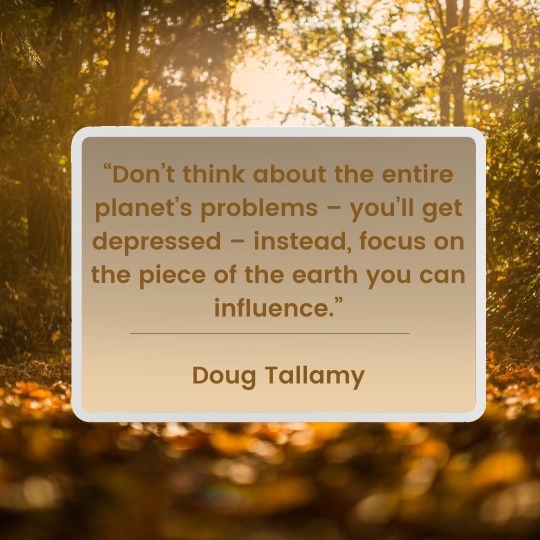
I'm so glad Doug said this because this is exactly how I see the world these days.
#nature#environment#pollinators#usa native plants#native plants#save the bees#midwest#birds#homegrown national park#backyard wildlife#doug tallamy#saving the environment#environmental destruction#climate disruption#climate change
27 notes
·
View notes
Text

🥵 NASA Announces Summer 2023 Hottest on Record
📈 Here are your go-to downloadable charts & graphs to share
🌡️ Reminder: NASA is in the TOP 4 trusted sources of global warming information for ALL POLITICAL DEMOGRAPHICS
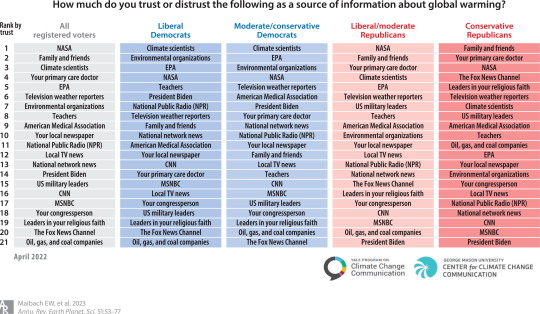
#climate change#climate#global warming#climate communication#NASA#hottest year on record#climate emergency#climate crisis#climate disruption#environment#stats#social science#global climate change#climate Data#trust
4 notes
·
View notes
Note
i just dont really understand why theyd target les mis? and like. its interrupting the work of actors and crew and house staff who dont have anything to do with fossil fuel corps. people who just paid to see the show who dont have anything to do with it.
i understand les mis is a show about rebellion and humanity but to me it doesnt make any sense.
( i say this as someone whos probably very unaware and very slow to realize the deeper meaning of things so i apologize if it comes off snobby i am just confused !! /genuine )
I'm very sorry if this comes off as rude but like.... "I don't understand why people would use Les Mis as the symbolic centerpiece of an act of protest/rebellion against the government" is just a very strange thing to say, and I'm genuinely not quite sure how to begin to respond XD. Like....it's literally Les Mis. It is Do You Hear the People Sing. The original novel was written to be a political rallying cry, it was written to bind together activists, and it has been used that way thousands of times since its publication in 1862. It's Les Mis, I don't know what else to tell you XD. Also I know this next comparison isn't perfect, but:
“I don’t understand why Les Amis interrupted Lamarque’s funeral. Obviously I agree with Les Amis’s goals, but was this really the right way to protest? Obviously the government is doing something bad— but was this symbolic event really the right place to talk about it? Why even choose to interrupt this event, and the lives of the workers leading it and everyday people attending it? It wasn’t responsible for what was happening!
Okay, yeah, I get the funeral is ‘symbolically significant.’ I get that Lamarque has become, in popular culture, a symbol of rebellion and resistance against a government’s unfair policies. I get Lamarque’s funeral is a pretty big public event that has a lot of symbolic significance ties to ideas of rebellion against the state.
I get that Lamarque’s words are often seen as a rebellious call to action, so illegally interrupting his funeral could be a statement about resisting tyranny. It could be a call to action playing off the popularity and symbolic role that Lamarque has in the public consciousness.
But at the same time— shouldn’t Les Amis have just gone to the palace and attacked the king directly? Why disrupt this symbolic event instead? They’re not really going after the people responsible!
After all, there were so many people there who just wanted a normal day. They weren’t responsible for what the government was doing and had nothing to do with it. They wanted to see the procession, to hear Lafayette’s speech and grieve a political figure they cared for. They wanted to hear people praise ‘resistance’ in the abstract, without actually doing it.
Weren’t Les Amis disrupting that?
Aren’t Les Amis bad activists? Isn’t disrupting people’s everyday lives for the sake of 'activism' always inherently a bad thing? I’m not against activism, but isn’t doing that kind of disruptive activism rude? Isn’t disrupting the lives of ordinary people just doing their jobs or going out for a special event evil— no matter why you’re doing it, or what your goals are, or whether the government actually is doing something vile that we should start to stage great events rallying against?
Even if this Lamarque's funeral has special significance because of its symbolic pop cultural ties to rebellion against tyranny—shouldn’t they have just avoided rudely interrupting some regular people’s everyday lives?
Protests shouldn’t disrupt things. they should be big parades that don’t make anyone uncomfortable, don’t interrupt anything, and don’t disrupt any aspects of ‘normal people’s daily life.’ No one should ever target symbolic events— like a funeral for a political figure or a musical about revolution— to make a political statement. Protests should be little quiet festivals that cause absolutely no interruption in everyday life so that we can all just safely ignore them, until the climate catastrophe they’re warning us about arrives.”
#les miserables#les mis#sklajdfsf sorry if this comes off as rude its also not my intention. im just a bit baffled XD#but slakdjfsdf#no hard feeligns though kinda#but protest is supposed to be disruptive and to prevent life from continuing as normal#and using Les Mis-- a story that is theoretically about rebellion against tyranny-- as the symbolic centerpiece of a disruptive protest#makes a lot of sense#and protests angrily decrying fossil fuel companies is important!#ive noticed its really easy to glorify the concept of protest/resistnace in the abstract#but its hard to deal with the fact a lot ground-level protest. is disruptive to every day people#because its suppsoed to be#and honestly the climate crisis will affect our daily lives far more than student activists interrupting a show#so people wll need to get refunds XD
237 notes
·
View notes
Text
.
#so much of like. the discourse I see online is based in this idea that humans are bad#like. the idea that all our development is evil and has only ruined the natural world#and that we should never disturb natural environments even in minor ways such as picking a wildflower while on a hike#or even like. that something like mountain biking is more disruptive to nature than just hiking and so shouldn't be done#I see this stuff all the time. I understand and agree with trying to be inobtrusive but also I don't think it's wrong to like#harvest wild berries. or flowers. or fiddlehead ferns!#humans are a PART of the natural world. the way many people make it seem like we're somehow antithetical to it#deeply bothers me#also keep in mind: I grew up in largely very backwoodsy subsistence-hunting type areas. so.#oh btw EDIT: I'm not talking climate change/overdevelopment of land here. I'm talking foraging and hunting and just.#humans existing in nature
10 notes
·
View notes
Text
youtube
In 2056 What a Difference Power Makes (Nursery) | In 20xx Sci fi and Futurism by In 20xx Futurism In a bleak, stormy landscape where the remnants of civilization eke out their existence in deep, canyon-worn refuges, the story plunges readers into the lives of a resilient colony struggling against the decay of both infrastructure and hope. The narrative paints a vividly harsh world where power is scarce and survival depends on ingenuity—from salvaging precious batteries amid ruins to the daily ritual of powering essential systems with human effort. The reader is invited to witness not just the physical battles against nature, but also the emotional and communal struggles that tie the survivors together. At the heart of the tale are characters whose lives are interwoven with the very fabric of their battered environment. Whether it’s a determined tinkerer engineering life-saving devices, or a reluctant caretaker balancing memories of lost innocence with the present need to sustain life, each individual’s story illuminates both the burdens and unexpected moments of beauty in a transformed world. Their interactions blend sorrow with the spark of tenacity, hinting at deeper mysteries and a shared hope that even in the direst conditions, human spirit can prevail. With its immersive blend of gritty survival, inventive adaptation, and poignant reflections on what it means to be human, this story offers a rich, atmospheric journey into a future where the past’s losses and the promise of tomorrow collide. The narrative masterfully avoids clean resolutions, instead leaving readers to grapple with the moral ambiguities of existence in a world stripped to its bare essentials—a world where every innovation is a lifeline, and every moment is a testament to the courage required to simply keep going. batteries solar panels cooling units aeroponics system hand crank flywheel generator power sippers AR glasses BritLights cool suits microbe engineering equipment DNA writer sequencer incubators protein printer pedal-powered generator bike respirators quantum computer Bose-Einstein condensate gravity sensor Stirling engine heat pump air filters hand crank wand canal links GM microbe mix bug trap system battery recharge station mining robot plasma drill graphene tube wiring hydraulic cylinders from a blimp enzyme welder temp shielding aerogel carb-core disks camshafts composite beams quantum simulation radio transmitter hume linking devices mycelium fabric garments mycelium filter sheets Doppler cooling laser Many of the characters in this project appear in future episodes. Using storytelling to place you in a time period, this series takes you, year by year, into the future. From 2040 to 2195. If you like emerging tech, eco-tech, futurism, perma-culture, apocalyptic survival scenarios, and disruptive science, sit back and enjoy short stories that showcase my research into how the future may play out. The companion site is https://in20xx.com These are works of fiction. Characters and groups are made-up and influenced by current events but not reporting facts about people or groups in the real world. This project is speculative fiction. These episodes are not about revealing what will be, but they are to excited the listener's wonder about what may come to pass. Copyright © Cy Porter 2025. All rights reserved. Episode link: https://ift.tt/lRNrm3e (video made with https://ift.tt/y2aJR5Z) via YouTube https://www.youtube.com/watch?v=p9DtQoKQEUs
#emerging tech#eco-tech#apocalypse#survival#disruptive#science#climate#future#short#solarpunk#post-apocalyptic#predictions#futurology#futurism#scifi#sci-fi#technology#tech#black mirror#Youtube
2 notes
·
View notes
Text
#disrupt burrup hub#woodside#environmental justice#environmental activism#activism#climate change#fossil fuels#donations#law#not transformers
5 notes
·
View notes
Text
.
This is very specific to Egypt but i hope everyone that uses fireworks for their wedding a very die i fucking hate you
#yes you are getting married we know everyone is its not that important there is no need to set of 50 fireworks like you are the president or#something shut the fuck up that stuff is noisy and disruptive and in this political climate completely insensitive to everyone thats alread#on edge because of the wars#i have to push down my panic and spend 15 mins talking to my elderly father who has ptsd from being forced to fight on the frontlines of a#war thats not his to fight that these are not bombs and that we are not under attack when i myself am scared shitless like a fucking dog on#the 4th of July honesty fuck you fuck you fuck you i dont give a shit that ur getting married nothing calls for setting off fireworks#FUCK YOU
6 notes
·
View notes
Text
Previously, when the Coastal Data Information Program (CDIP) buoys detected a reading over 35 degrees Celsius, the reading was assumed to be a possible sign of instrument damage or malfunction.
But this may be the new normal.
Earlier this week, the CDIP 256 buoy — located in the Gulf of Mexico off the coast of Louisiana — clocked a record reading of 35.0 degrees Celsius, or 95 degrees Fahrenheit; the warmest detected sea-surface temperature in the history of CDIP.
View the data here:
I’ve been listening to several things on the collapse of the Old Kingdom in Ancient Egypt, which occurred as a result of droughts caused by Atlantic current disruptions that were less severe than is looking likely within the next 25 years. Disruption in food systems destroys civilisations.
I think a lot about Tolkien’s thoughts on despair and how it drains the ability to fight for the future. I am aware that, as a Northern European, I am very literally in a better place to survive this than people in the Global South, many of whom are already suffering the impacts of climate change.
About the best thing I can say, if you also live in the Global North, is to be galvanised by our responsibility to help people who need to flee uninhabitable areas however we can, whether that’s political or personal (or ofc both). We need to step up in building stronger communities *and* on putting pressure on the state to arrest and reverse their fascist leanings. And we need to be there for refugees and work on actively accepting and absorbing people into our communities, including old and poor and disabled people.
We need to *help*. And if we despair we won’t.
The way we survive as humans is by doing things for each other. And if we die, which we will eventually no matter what we do, we hopefully help there to be a world where there are still humans, and there are still other creatures we value too.
I’m thinking a lot about “Let this radicalise you rather than lead you to despair.” It’s the best thing that’s working for me so far about taking this in.
We can’t despair. There is work to be done.
#a queer crip grows#climate crisis#climate change#ocean temperature#refugees#climate refugees#let this radicalise you rather than lead you to despair#atlantic current disruption
9 notes
·
View notes
Text
#1. Global Politics#“2024 US Election”#“Russia Ukraine conflict”#“China Taiwan tensions”#“Israel Palestine ceasefire”#“NATO expansion”#2. Technology & Innovation#“AI advancements”#“Quantum computing breakthroughs”#“ChatGPT updates”#“5G technology”#“Electric vehicles news”#3. Climate & Environment#“Climate change summit”#“Carbon capture technology”#“Wildfires 2024”#“Renewable energy news”#“Green energy investments”#4. Business & Economy#“Stock market news”#“Global inflation rates”#“Cryptocurrency market trends”#“Tech IPOs 2024”#“Supply chain disruptions”#5. Health & Wellness#“COVID-19 variants”#“Mental health awareness”#“Vaccine development”#“Obesity treatment breakthroughs”#“Telemedicine growth”
3 notes
·
View notes
Text

Another Present is Possible
These examples of events in the recent past give us a terrifying image if we extrapolate them into the future. Assuming they will only intensify with climate change they in no way show us the collapse of civilization as we know it - i.e. a world order of economic and political inequality (inside and between nations), domination and exclusion. On the contrary, this "realist" model shows us that it is not the collapse of order we need to fear but its continuation. But the picture I have presented of the present is only partial and therefore misleading. In recent years we have seen many other social reactions to disasters which point towards a completely different future.
During Hurricane Katrina thousands of volunteer activists arrived in New Orleans, not to distribute charity but to offer their solidarity. They helped the communities who were already coming together to set up local information centers where people could find their loved ones, offer their skills, leave or take supplies, etc. The same happened during the other disasters mentioned here. This spontaneous "disaster communism" or "disaster anarchism" has a long history: when the imposed order of the state and capital retreats people rarely react the way Leviathan assumes - when people find themselves in shared circumstances they are at least as likely to start helping each other as they are to start fighting.[54] A crucial difference over the recent years is that it is no longer spontaneous: communities are learning from past events are preparing for the next; they are practicing the skills required and building communities and networks that prepare them for the future by changing how they relate to each other in the present.
This is about more than surviving during a disaster. In New Orleans the organizations Common Ground Relief and the Common Ground Health Clinic were established to provide immediate relief and mutual aid, but they continue to this day long after the disaster as community led organizations for social justice and self-management. They are now part of the growing network Mutual Aid Disaster Relief which help communities prepare for disasters before they happen, using principles of mutual aid and self-empowerment instead of dependence-creating, top-down "charity."
During Hurricane Sandy in New York, thousands of volunteers came together to organize the relief effort. Their efforts were helped by existing networks of communication and trust established during the Occupy Wall Street protests. The movement Occupy Sandy organized around 60,000 volunteers in an effective relief effort that outperformed both the Red Cross and the government agency FEMA.[55] A report from the Department of Homeland Security praised the decentralized, horizontal and transparent model: "We can learn lessons from Occupy Sandy's successes to ensure a ready and resilient nation."[56]
When the state's branch of repression has such praise for decentralized structures there is reason to be weary of co-optation. Governments could use the potential for community self-organizing to justify neoliberal austerity policies. But since top-down government "rebuilding" efforts have also been used to implement neoliberal policies this is only a reason to further insist on strengthening and radicalizing the grass roots movement and combining the emergency relief and post-disaster rebuilding with an egalitarian anti-capitalist practice. The activists in Occupy Sandy had seen what happened after New Orleans and were from the beginning focused on preventing and resisting the gentrification that often follows with the recovery process.
Furthermore, these movements are not merely reacting to emergencies, trying to survive in the disaster. They are also engaged in climate mitigation by focusing on the environmental surroundings of their communities. Common Ground in Louisiana runs a program for wetlands restoration which is necessary for mitigating the effects of climate change (the wetlands protect against hurricanes and land-loss) and play a part in reducing climate change (by storing CO2). Most importantly though, these movements are building new praxises and social relations that are necessary parts of a different social order beyond capitalism and the Leviathan.
This is not political idealism as in the opposite of "realism" - I have again merely pointed out things that actually exist in the real world and many more examples could be given from many other parts of the globe. As Martin Buber noted,[57] all societies contain to some degree both the "political principle" (organization characterized by domination) and the "social principle" (association based on common needs) and any realistic analysis would be lacking if it merely focused on one, not merely because it would miss part of reality but because it would affect our actions and thus shape reality. The two narratives give us radically different affective states and have the potential to shape our ideals for the future and our capacities in the present. Both principles will likely be intensified with climate change; which one will be stronger depends on what we do.
The movements described may not today be big enough to replace the system in its entirety and stop climate change but they do provide us with a lived and "concrete utopia"[58] which can give us the hope and trust necessary to break the paralysis caused by an overpowering fear of climate induced societal apocalypse. They show us that it is not the breakdown of the current order we need to fear. If we are to avoid climate catastrophe the social order must be radically changed. Communities and movements like these are part of determining the direction of that change - they allow us to prepare for the future by changing the present, thereby expanding our collective imagination of what is possible. Their most important function might be to dispel the Hobbesian fantasy.
#Climate Disruption#Political Stability#climate crisis#environmental justice#political philosophy#autonomous zones#autonomy#anarchism#revolution#ecology#climate change#resistance#community building#practical anarchy#practical anarchism#anarchist society#practical#daily posts#communism#anti capitalist#anti capitalism#late stage capitalism#organization#grassroots#grass roots#anarchists#libraries#leftism#social issues#economy
4 notes
·
View notes
Text
Anyone else getting tomatoes in October 😳
1 note
·
View note
Text
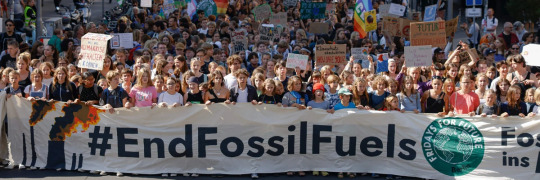
"The actions come amid the hottest summer on record and as experts continue to sound the alarm over unwavering environmental destruction, especially by the fossil fuel industry and its political and financial backers."
"Climate chaos—fueled by oil and gas giants that have spend decades lying about their planet-heating pollution along with rich governments and institutions that continue to break their promises and pump billions of dollars into the fossil fuel industry—is already killing people. The death toll from flooding in Libya this week has climbed to 11,300."
#climate chaos#climate disruption#climate action#climate action now#climate crisis#climate protest#March to End Fossil fuels#fossil fuels#climate March#collective action
2 notes
·
View notes
Text
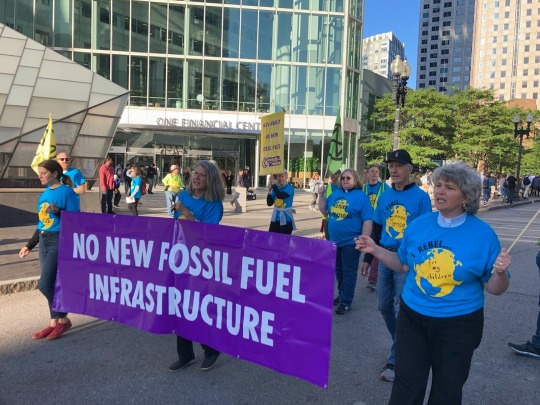
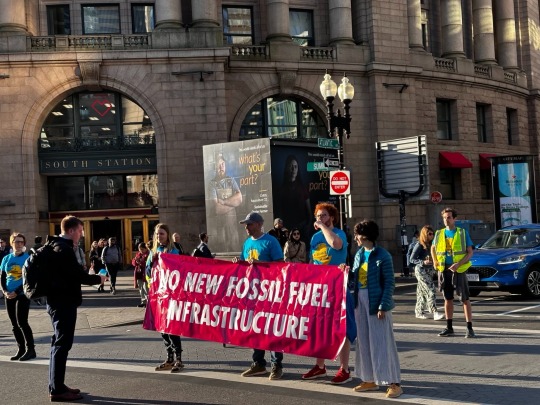
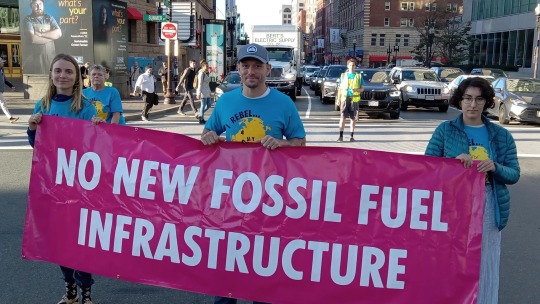




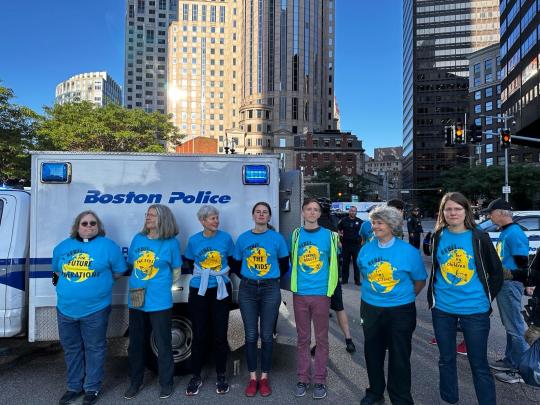

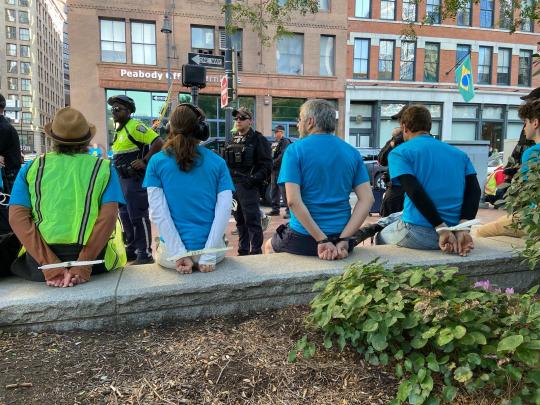

Climate Activists Disrupt Boston Rush Hour Traffic
On Thursday September 21, more than 35 climate activists from XR Boston shut down traffic around the financial district to demand that the Healey administration ban new fossil fuel infrastructure. Three independently moving groups of XR rebels marched slowly around the intersections of Atlantic Ave and Seaport Blvd., Atlantic Ave. and Summer St., and Purchase St. and Summer St. creating traffic gridlock. The activists communicated that they would refuse to end their traffic disruption unless the Governor made a public statement committing her administration to opposing all new fossil fuel infrastructure projects, including the expansion of airports and gas connections in new buildings.
The activists wore blue shirts with yellow illustrations of the Earth accompanied by slogans "I rebel for..." followed by personalized messages (my kids, a livable future, etc.). They held large banners reading "No New Fossil Fuel Infrastructure" and chanted "Governor Healey, you make the rules, time to ban new fossil fuels," "Massachusetts, don't delay, ban new fossil fuels today."
When asked why he chose to participate in non-violent civil disobedience, Monty Neill, an event organizer and one of the arrested climate activists, replied "My grandchildren are facing a world of climate and ecological collapse, with social crises inevitably following. How bad it will be depends on what we do today. An easy first step in Massachusetts is to halt fossil fuel expansion. Leaders must lead, not see what lobbyists say or fear to ‘spend their political capital.’ Governor Healey and the legislature must act now, no more delays."
Jana Pickard-Richardson, another activist with XR Boston, added "I’m risking arrest today out of love and rage. Love for the millions upon millions who stand to lose their homes, and even their lives in this worsening climate crisis. And rage at the politicians who have wasted decades with incremental actions and business as usual. And now as the signs of the crisis unfold around us, our government still is not acting with the urgency the situation demands."
Over 20 activists were arrested after blocking rush hour traffic for almost 30 minutes. In an August meeting with XR Boston, Climate Chief Hoffer admitted Massachusetts won't make its legally binding target to reduce emissions 50% by 2030, per the 2021 Act Creating A Next-Generation Roadmap for MA Climate Policy. She promised that the Healey administration would release a statement shortly. There has been no statement. We are escalating. Our lives depend on it.
Photos by Cam Lawless, Jesse Kieffer, Skip Schiel, Haley McH, Jule Manitz
#boston#extinction rebellion#civil disobedience#climate activism#xrboston#general disruption#traffic#rush hour#slow march#arrests#non-violent#week of rebellion#climate emergency#fossil fuels
12 notes
·
View notes
Text
Seraikela Kharsawan Faces Lowest June Rainfall In 22 Years
36.1 mm Recorded, Far Below Normal Levels, Impacting Agriculture Farmers concerned as lack of rain disrupts paddy cultivation cycle. SERAIKELA – The Seraikela Kharsawan district has had its lowest June rainfall in 22 years, with only 36.1 mm recorded, which is significantly below the usual levels. "The amount of rainfall we’re receiving is not enough to meet our farming needs," expressed a local…
#Agricultural Cycle Disruption#राज्य#Climate Variability Jharkhand#Farmer Concerns Seraikela#Jamshedpur weather patterns#Jharkhand Agriculture Concerns#Jharkhand Drought Concerns#June Monsoon Failure#Monsoon Delay Impact#Paddy Cultivation Disruption#Seraikela Kharsawan Rainfall Deficit#state
2 notes
·
View notes